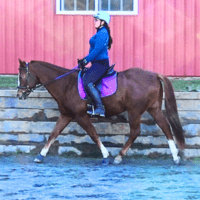Are you trying to figure out if it would be cheaper to keep your horse at home with you instead of boarding?
Or do you just love the idea of your horse being in your backyard and want an idea of the costs?
Though more work, keeping a horse at home is typically, not always, cheaper than boarding your horse. The initial cost of bringing your equine home can be $500-$100,000+. The average monthly cost to keep one horse at home is $250-$500 a month and $3000- $6000 a year.
The cost of keeping a horse at home can range greatly, just like the cost of boarding can also vary greatly.
READ POST>> Beginner’s Guide To Buying Your First Horse
When factoring in these costs, you need to realize that you can’t just have one horse at your home. Horses are herd animals and need suitable companions.
- You will need to buy another horse or at least a suitable companion animal if you are going to keep your horse at home.
- There are many homeless horses looking for companion homes that are unrideable and can be adopted at a very low price.
- Ponies and miniature horses cost less to maintain and can be a good option as a companion for your horse.
- Another way your horse can have companionship is by finding borders. However, you will need to purchase extra liability insurance.
For More On This, Read: Does My Horse Need A Companion by TheSprucePets
Initial Costs Of Keeping Your Horse At Home
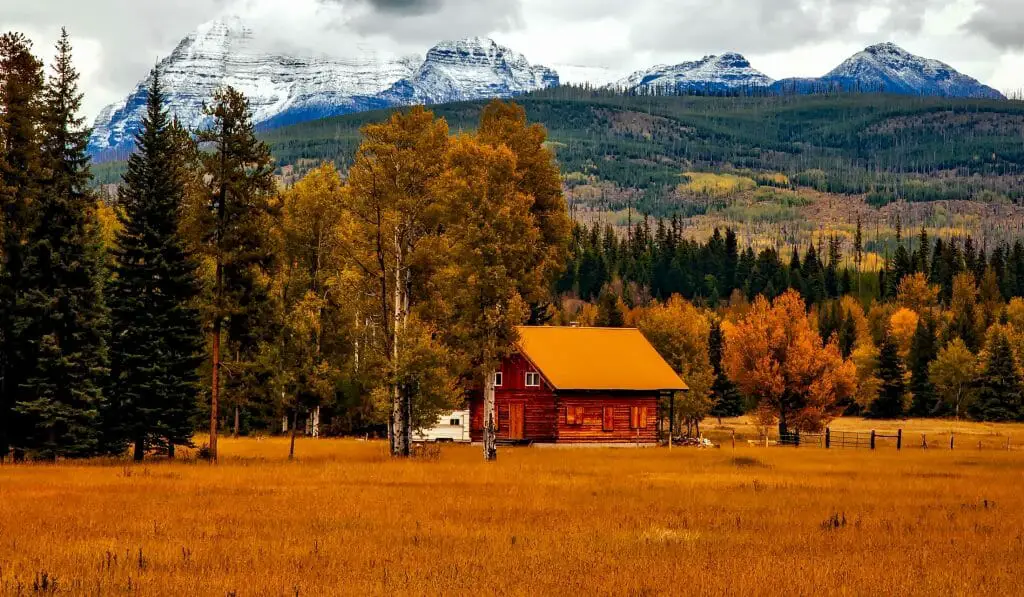
The start-up cost for keeping a horse at home will vary from home to home. Here are some things to consider when figuring out how much it will cost you to keep your horse at home.
Horse Property Costs
First you need a place for horses! Here are some questions to mull over depending on your horse facility situation.
You Have A Horse Farm
- Do you have a horse barn in good condition?
- Do you have paddocks with safe fencing and gates?
- Does the water for the barn work?
- Is the electricity working and up to code?
You Have A Fixer Upper Horse Farm
- Is your barn run down and a fixer-upper?
- Do you need to fix paddock fencing and gates to make them safe?
- Do you need to add anything to the barn?
- Does the riding arena need new footing?
You Have The Land But No Horse Farm
- Or are you just starting off with the land and need to build a barn and paddocks from scratch?
- Do trees need to be taken down?
- Do you want a barn with stalls? A shed row? A run-in shed?
- What kind of paddock fencing is right for your property?
- Do you want to build a riding arena?
Whichever one of these situations maybe you, first you need to figure out everything that needs to be done to make your property horse ready.
Then you need to figure out how much all that is going to cost. This is part of your start-up cost of keeping your horse at home that you need to consider.
This is just the start of the costs that are going to be involved with keeping your horse at home.
Purchasing A Second Horse
One does not just simply keep a horse at home on it’s own. Your horse needs a friend. So times the cost to keep a horse at home by 2.
Although not everything in the budget needs to be doubled, such as barn equipment, trailer, and what ever else you only need 1 of.
Upfront Costs Involved With Another Purchasing Horse
- Purchase or Adoption $500-$10,000
- Pre-purchase vet exam $300-$1000+
- If you hired professional help finding horse (commission or set fee) $100-$500+
- Gas costs of traveling to look at horses
- Transportation for horse $100-$1000
Horse Equipment & Tack
If you already own a horse then you may have all the tack and horse equipment you need.
But if you another horse or your first couple horses, then you need to make sure you have all the proper equipment to own a horse.
This is another big start-up expense. It can sometimes cost more than the purchase price of the horse depending on what your budget was.
You can expect to pay anywhere from $1000-$5000+ on your horse’s tack and equipment.
Check out this blog post at the Savvy Horsewoman for more on the basic equipment needed for a horse: Horse Supplies on a Budget: The Bare Essentials You Need for Your New Horse
Horse Farm Equipment
There is basic equipment you will need to maintain your horse farm and their is equipment that would be convenient and nice to have.
There is equipment and hardware for the paddocks, stalls and barn.
The equipment you purchase for your farm will depend on your budget and needs.
The prices listed are just common prices found on the internet for the USA to give you a sense of the cost.
Expect these prices to vary depending on location, brand, and whether you buy new or used.
Basic Equipment To Maintain Horse Farm $209+
- Pitchfork $20
- Wheel Barrel $120
- Rake $13
- Broom $30
- Muck Tub $20
- Bucket Brush $6
Basic Equipment For Paddocks, Barn & Stalls $280+
- Water Trough $100
- Double End Snaps $2
- Screw Eyes $2
- Water Buckets $10
- Feed Tub $20
- Salt Lick Holder $5
- Steel Trash Can (For Grain Storage) $25
Nice To Have Horse Barn Equipment
- Gator, ATV, or 4 Wheeler $8,000
- Tractor $20,000
- Leaf Blower $100
- Ride-On Lawn Mover or Pull Lawn Mower $1500
- Pick-Up Truck $25,000
- Snow Plow $1,500
- Horse Trailer $10,000
- Arena Drag Harrow $500
- Ground Poles and Jump Standards $2000-$10,000
- Cavalleties Set Of 4 $300-$500
- Slow Hay Feeders $350
- Heated Horse Water Buckets $35
- Heated Paddock Water Buckets $65
Monthly Expenses
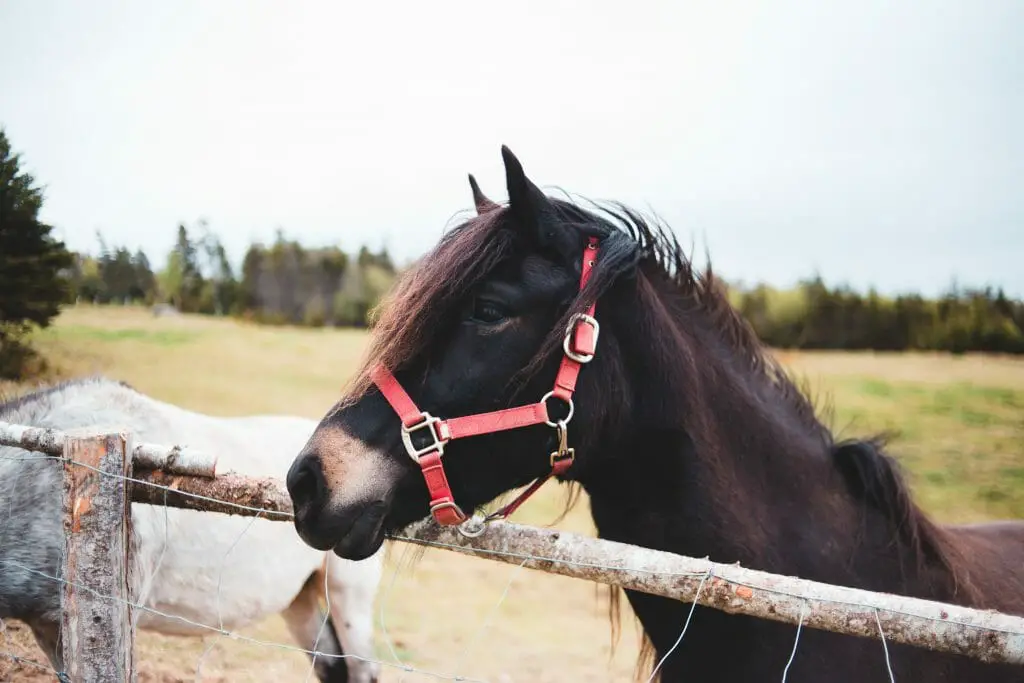
Cost Of Hay
The amount of hay needed will depend on the horse.
In general, a horse should eat 1.5 percent to 2 percent of their body weight of hay per day. If the horse is 1000lbs they will eat 15 to 20 pounds of hay daily.
Square hay bales tend to be around 40-50lbs at $5-$12 per bale.
A 1000lb horse will be eating 12-15 bales per month.
That would $60- $180 per month on hay for 1000lb horse.
Cost Of Shavings
The amount of shavings you use will depend on
- How deep you like to keep the bedding in the stalls.
- How long the horse stays in the stall.
- How much bedding you save or waste when mucking stalls.
- How neat the horse is in their stall.
A horse that is turned out during the day and turned in at night, that isn’t a super messy pig in the stall, will use about 12 bags of shavings per month.
Shavings bags are usually $5-$8 per bag.
So for the average horse shavings will cost $60-$96 per month
You can save money on loose shavings. But you need a proper, accessible place to store the loose shavings.
There are also alternative bedding’s aside from shavings. Straw bedding is more difficult to clean and less absorbent, but it is cheaper.
Cost Grain
Not all horses need grain. However much of the hay that horses are eating lack key vitamins and minerals which are vital.
Grain can be a supplement to the hay, in order to ensure proper nutrition.
There are also horses that need the extra calories, because they have a moderate work load, or they have a high metabolism with difficulty keeping weight on with hay alone.
Each grain bag has a chart to go by in order to figure out how much grain your horse should be getting.
It is a good idea to research the different grain options and choose a grain that is best suited for your horse specifically.
The feeding chart will be based on the nutrition in the grain, the horse’s weight and the horses work load.
If the horse needs to gain or lose weight then it is best to talk to your veterinarian or a equine nutrition specialist that can help you figure out a good amount.
Grain bags come in 50lbs and are typically $15-$30 per bag.
A 1000lb horse doing average work will use up around 4-5 bags of grain per month.
Grain would come to about $60- $150 per month.
Supplements Or Medications
Horses don’t necessarily need supplements or medication unless there is a problem or nutrition is missing from their diet.
If your horse has poor quality hooves then they may benefit from a supplement with biotin, methionine, zinc, copper, lysine, and fatty acids.
If your horse is having trouble keeping on weight then they may benefit from a supplement with protein and high fat.
If your horse seems to have muscle weakness or a poor immune system horses can benefit from Vitamin E.
Horses that get mostly hay are usually not getting enough vitamin e unless the hay is very good quality and nutrient-rich.
The National Research Council recommends horses consume 1-2 IU of vitamin E per kilogram of body weight per day, which equals 1,000-2,000 IU per day for a 500-kilogram (1,100-pound) horse
TheHorse.com
Sometimes horses need to be on maintenance medications as well as supplements, especially as they get older.
The 20-year-old gelding I am leasing is on Previcox. The dog version of Equioxx. It is cheaper but the same medication, the dosing is just different.
He is on this for arthritis and like a different horse.
Some horses that get Cushing’s disease when they get older are still good to go but need medication to manage the disease.
Some mares that get moody benefit from hormone medications.
Your best bet for factoring in supplements and medications is finding out what your horses need.
Costs can vary greatly for extra medication or supplementation and your horses may not need any.
Riding Lessons
Are you going to have a riding instructor come to the barn and give you lessons? Or are you going to trailer in to a farm and take lessons with your horse?
This is another expense to consider. Owning a horse you have probably taken lessons for a while and know the cost involved.
Riding Lessons are typically $45-$100 ea. depending on a handful of factors.
Most people take 1 lesson per week so you are looking at $180- $400 per month.
Manure Removal
It is important to have a plan for what to do with all the manure your horses are going to produce.
Some people make their own compost. Which is actually a lot of work as the pile needs to be rotated and watered.
You also need enough space for the manure to compost and will have to create several piles. It’s easiest to do this if you have a tractor.
Many barns just have the manure taken away.
There are companies that will bring a trailer or a shipping container for you to dump the manure into and they will haul it away and replace it with an empty one.
You choose the interval for them to come take it.
The more often the company comes to remove manure and the bigger the container or trailer the more expensive it is.
According to scooplepoop.com manure removal services range in price from $4- $15 cubic yd.
Horse & Farm Insurance
There are different kinds of insurance you will want to consider for your farm and for your horses.
Disclaimer: I am not a lawyer or an insurance broker, just sharing what I know. So make sure you consult a lawyer or an insurance company.
Insurance For Farm:
For your farm, you will want liability insurance, even if it is your own private barn. In case someone was visiting and got hurt.
Horses are considered a hazard like a pool is. So if someone wanders over in your yard and drowns in your pool you the owner of the pool is liable.
With horses if someone wanders over to your barn and go’s in the paddock or gets hurt by the horses somehow even though they do not have permission, you are liable.
If you are boarding horses then you will have to get extra liability insurance that supports boarding horses.
Insurance For Horses:
Liability insurance should be covered under the horse farm liability insurance. But if you were boarding you can get liability insurance specifically for your horse.
Mortality insurance is in case your horse dies, under certain circumstances, you get paid in the horse’s value or part of the value.
Loss Of Use insurance is if something happens to your horse where they can no longer perform what the horse was purchased for.
For example: the horse is an eventer and gets injured and can no longer jump. You get paid the agreed-upon amount.
Major Medical insurance covers vet costs such as visits associated with an injury or illness, diagnostics, medication, and surgery.
Surgical insurance only covers the horse’s surgery expenses if the horse ended up needing surgery.
According to generalliabilityinsurance.com insuring horses and a small horse farm is around $67 to $99 per month.
Bi-Monthly Expenses
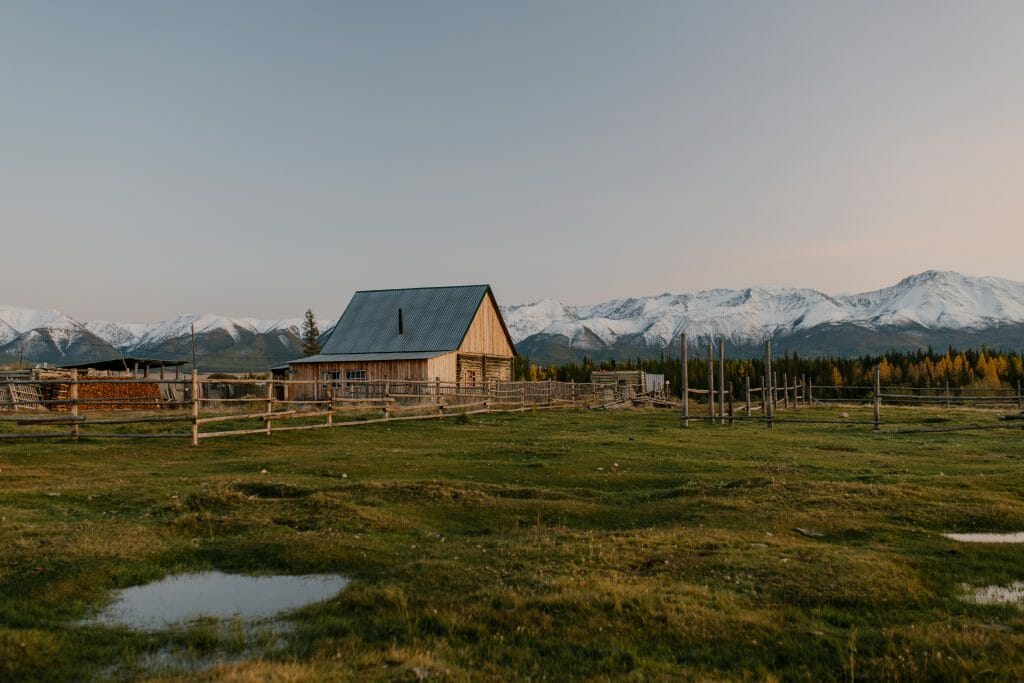
Farrier
The farrier will need to come do your horses feet every 4-8 weeks depending on your horse and the time of the year.
Prices for trims and shoes will vary based on what kind of shoes if the horse has just fronts, all fours, or is barefoot.
Barefoot is the best option for horses but sometimes they need the extra protection and support of shoes.
Metal shoes and nails are not the best options for horses read my blog post about it and some alternatives to metal shoes and nails. Do Horses Need To Wear Shoes?
Trims are the cheapest and range from $40-$80
Front shoes are typically $80-$200
All 4 Shoes are $100-$400
De-Worming Cost
It used to be that horses were rotated on wormers every other month. There was a certain de-wormer you would use for that time of the year. You could even buy a package of six wormers which would last for the year.
Some still manage horses with worming in this way. However, more and more vets are advising against it because the de-wormers are becoming less effective against the worms.
Instead, they are suggesting testing the horse for worms by mailing in a fecal sample to a lab.
Then worming the horse based on the results. If the horse has worms then they can have a de-wormer administered that is meant to kill that type of worm.
If the horse doesn’t have worms then they don’t need to be dewormed.
Testing is typically done each season, so about 4x per year.
Smart Pak does fecal sample testing and it is $30.50.
Bi-Yearly Horse Expenses
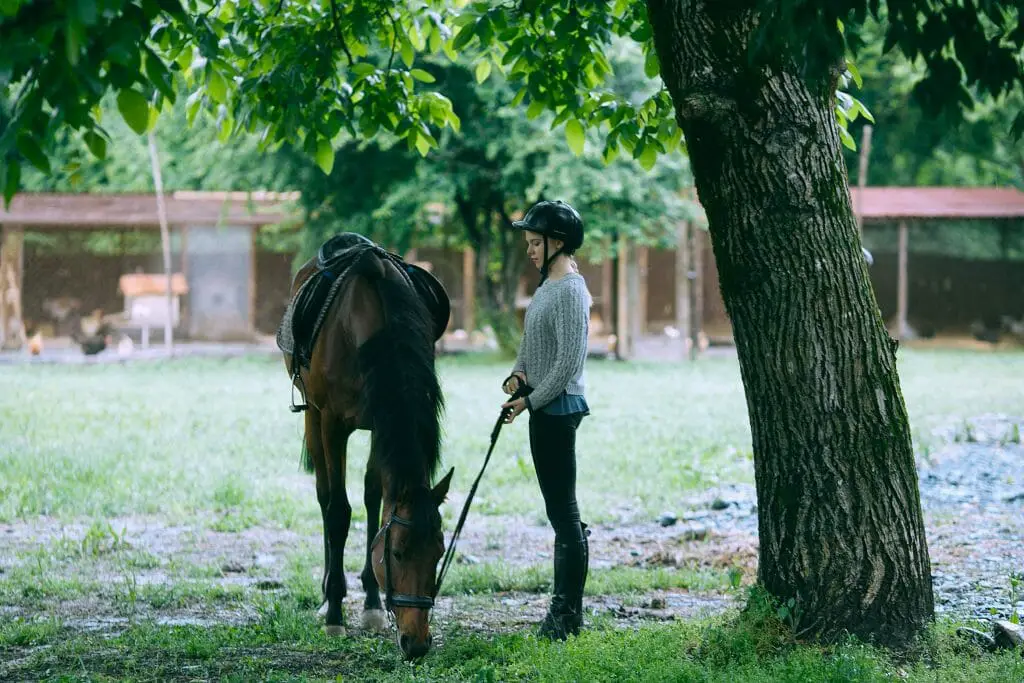
Vaccinations
Horses typically get vaccinations in the spring and the fall.
This includes a rabies shot, and Coggins test once a year, and then a handful of other shots.
The other vaccinations depend on location, if the horse is going off the property for whatever reason, and if the owner wants other optional vaccinations.
Coggins and rabies done by the vet cost between $60- $120
Other Vaccinations Spring/ Fall $150- $300
The vet will also have a travel fee. It is smart to roll in other services such as a wellness exam and teeth floating.
Teeth Floating
Your horse should get their teeth floated every year. Some horses that don’t have the best teeth or alignment may need to be floated 2x per year.
Usually senior horses get to the point even if they had good teeth it is best for them to be floated 2x per year.
Teeth floating horses typically costs $80-$200.
If the horse needs it (most do) sedation is another $10-$30.
Tooth extractions if needed cost between $20-$80.
Annual Horse Expenses

Unexpected Vet Expenses
Horses are accident-prone. It is not if your horse is going to get hurt it is when. You need to be prepared for when your horse is going to get sick or hurt.
Sometimes this will be a lameness that you can call for a vet appointment or emergency care that is needed right away.
Having insurance to cover some of this is a great start, but you should definitely still have a veterinary emergency fund.
If your horse ends up needing colic surgery you could be looking at over $10,000. Most emergencies don’t cost that much but it is possible.
To be safe it is a good idea to have a minimum of $5000 put away per horse preferably more.
If you can’t do that right away then start putting money away every month and build that emergency fund.
It will give you more peace of mind knowing you have the money if needed.
Barn & Horse Equipment
Although you may have got all the equipment and tack, you needed for the barn and your horses they will degrade, wear down, break, and need replacements.
Another reason for new equipment is simply you want an upgrade.
Expect to spend varying amounts of money on whatever might need to be replaced each year.
Trailer Servicing
If you have a horse trailer, like your truck, it should get inspected ideally once a year to make sure it is acceptable and safe.
A trailer inspection costs between $10-$60.
Conclusion
Horse keeping is not a cheap endeavor. You need to make sure you can afford the costs associated with keeping a horse.
Keeping a horse at home is generally cheaper than boarding if you are careful with your budget.
But seeing as you will have to have another horse on the property it can end up being more expensive than boarding your horse or about the same.
Expect to pay around $400-$1000 a month for 2 horses at home.
Make sure you write down a budget and make a plan before you make the final decision to have horses at home.
Having someone board a horse at your barn is an option. But you need to get the right insurance and have a suitable facilities for a boarder.
However there is more to consider than just the costs of keeping a horse at home. There is a lot of work to be done.
Horses at home will take a lot of your time and whenever you want to go away on a trip you will need reliable help to care for the horses while you are gone.
How much do you spend on your horse every month? What is the most expensive thing you spend on your horse? WRITE IN THE COMMENTS! 🙂
Cheers, Kacey

